This week, I was writing an article about a shoe designed to be easy to put on and take off. Ah, the frustration of writing that phrase, to put on and take off. I wanted to shorten it: put on and off, take on and off. But you don't 'put off' or 'take on' your shoes unless you're in some sort of argument or fight, with your footwear. What I really wanted to write was that this shoe is 'easy to doff and don.' But some readers might not understand me if I wrote that, and I wasn't willing to sacrifice clarity for brevity (if making the piece two words shorter can be considered real progress toward brevity). So let's go on and on about doff and don in a separate article!
Doff and don do indeed mean to take off and to put on, respectively. They are contractions of 'do off' and 'do on,' according to Chambers Etymological Dictionary. 'Do' once had the meaning 'to put or place,' it seems. The Shorter O lists 'put or place' as the first meaning of 'do.' It then goes on to say that this meaning is "obs. exc. dial., with preps. (see do off etc. below)." I think the Shorter O would do well to pay a bit more attention to clarity, here. Expanding the abbreviations, the Shorter O is saying that the put or place meaning of do is obsolete except for dialect-related uses with prepositions. Prepositions such as off and on!
Memorizing the prepositions was something many students of my generation did at some point. I did that exercise in the 8th grade. A preposition, we learned, is something a squirrel could do to a tree. Well, not exactly. The squirrel goes _____ the tree, the blank being the preposition. The squirrel goes around the tree. The squirrel goes up the tree. The squirrel [tries to go] through the tree. As I contemplated writing this post, I of course wondered what other 'do + preposition' constructions might be out there waiting to be discovered. For ease of contraction, the prepositions would need to start with vowels. There aren't many exciting options. Maybe we could start using 'dup' as a contraction of 'do up,' as in 'I dupped my hair because it was hot.' Or 'dover' could mean 'do over.'
It turns out that 'dup' is already a word, albeit an archaic one. This contraction of 'do up' means to open, according to the Shorter O. Let's see that squirrel try to dup the tree. Dover is also a word. According to the Shorter O, to dover means to "doze or be unconscious" or to cause to doze or be unconscious. Or to "wander aimlessly or confusedly; walk unsteadily." Dover can also mean, as a noun, "a light or fitful sleep; a doze," according to the Shorter O. Dover's powder, the next entry in the Shorter O, is "a mixture of opium and ipecacuanha." You might think it would be used to dover people, that is, put them to sleep, especially given the opium content, but no. It was named after physician Thomas Dover. According to the definition in the Shorter O, Dover's powder was used to ease pain. Or induce sweating. I don't think the tree will be in need of dovering from the squirrel. For now, I will give the squirrel a break and sign off.

No comments:
Post a Comment